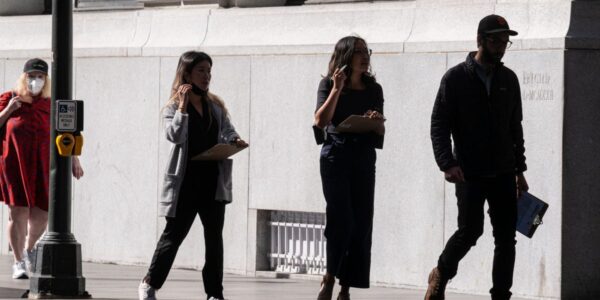UNIVERSITY PARK, Pa. — As doctoral college students in Penn State’s School of Agricultural Sciences, Wei-Shu Lin and Parisa Nazemi Ashani are dedicating their educational research and future careers to enhancing ecosystems, together with the Chesapeake Bay, the most important estuary in america.
Lin and Nazemi Ashani lately have been supplied an opportunity to collaborate with the Chesapeake Bay Basis and a company associate, Plantra Inc., to optimize the environmental advantages of the Keystone 10 Million Bushes Partnership, a program designed to revive the Chesapeake Bay. Each college students jumped on the alternative.
The Chesapeake Bay is impacted by the poor well being of the streams and rivers that feed into it, in keeping with Brenda Lee Sieglitz, senior supervisor of Keystone 10 Million Bushes Partnership for the Chesapeake Bay Basis. Sediment and excessive ranges of nitrogen and phosphorus gas unnaturally excessive ranges of algae development within the water, blocking daylight from reaching underwater grasses that function meals and habitat for aquatic organisms.
Sieglitz mentioned one solution to mitigate the affect on the bay is by planting timber. Since 2018, the nonprofit has collaborated with nationwide, regional, state, and native companies, conservation organizations, outdoor fans, companies, and residents — every with its personal function for getting these timber within the floor.
“Bushes naturally cut back polluted runoff and stabilize streambanks, supercharging our streams’ capacity to cleanse themselves of air pollution,” she mentioned. “Buffers planted alongside streams have been confirmed to extend a stream’s capacity to course of vitamins and natural matter.”
To boost the survival and development of the planted seedlings, the partnership works with Minnesota-based Plantra Inc. to provide “develop tubes” and coaching stakes, which give a greenhouse setting that protects and promotes wholesome development throughout institution.
Nevertheless, the protecting tubes and assist stakes are created from nonbiodegradable supplies. Desirous about making certain no waste stays within the setting long-term, Plantra and the Chesapeake Bay Basis teamed as much as develop progressive concepts to make sure simple restoration of develop tube techniques for recycling and reuse.
The challenge was adopted by Maria Spencer, the John and Patty Warehime Entrepreneur in Residence within the School of Agricultural Sciences’ Entrepreneurship and Innovation program. Spencer teaches “Agricultural and Extension Training 597: Innovation and Important Pondering Practicum,” a course that allows college students to realize real-world innovation expertise and to domesticate relationships with business mentors. Spencer recruited budding engineers Lin and Nazemi Ashani for the chance due to their experience in biomaterials and their enthusiasm for environmental sustainability.
As college students within the practicum, Lin and Nazemi Ashani are working alongside professionals from Plantra and the Chesapeake Bay Basis to ideate potential sustainability enhancements for the develop tubes. The near-term innovation goal is an answer to make sure that develop tube stakes may be eliminated simply from the bottom for reuse as soon as seedlings are established.
Spencer mentioned pleasure concerning the challenge is rising, as creativity to make stakes simpler to take away from the sphere additionally could cut back the labor required for his or her set up. At the moment, a stake should be pounded 18 inches into the bottom. As a result of it’s made from a versatile materials, it wiggles and requires extra drive to drive it into the soil. The scholars are envisioning a biodegradable base for the stakes with the concept that a base might assist in each set up and removing.
“The potential for this innovation is unimaginable, and I’m so grateful to Plantra and the Chesapeake Bay Basis for partaking Penn State on this challenge,” mentioned Spencer. “It’s an actual win-win when our college students can acquire expertise whereas making use of their schooling to real-world points they’re obsessed with.”
For Nazemi Ashani, working with Plantra and the Chesapeake Bay Basis has allowed her to get to know folks within the business with an curiosity in sustainability.
“This is a chance to use my engineering data to assist make this effort sustainable,” mentioned Nazemi Ashani, who’s pursuing a doctorate in agricultural and organic engineering. “I worth such experiences as a result of they provide me a real-world view of the ideas I’m studying in academia. Whereas realizing the idea behind each idea is necessary, studying how you can put them into apply is a special ability.”
Lin, a doctoral candidate in biorenewable techniques, is optimistic about their capacity to contribute progressive concepts.
“As scientists within the discipline of sustainable supplies, our social accountability will likely be using our experience to mitigate local weather change and shield the setting,” mentioned Lin. “We consider that applied sciences now are mature sufficient, and I wish to maintain working on this discipline to discover extra potential functions of sustainable supplies.”
Joe Lais, founding father of Plantra, credited Spencer for shepherding the collaboration and sees the partnership resulting in extra tasks with Penn State to boost tree-establishment sustainability.
“At the moment, we’re targeted on how the greenhouse develop tube may be supported by an improved staking idea that allows simpler discipline restoration of the whole system and promotes greater reuse charges for the assist stake,” he mentioned. “Tomorrow’s problem might goal enhancing the sustainability of the develop tube itself. The alternatives to get rid of or reduce the affect of introducing plastics into the setting is our purpose, and we consider Penn State can assist get us there.”
